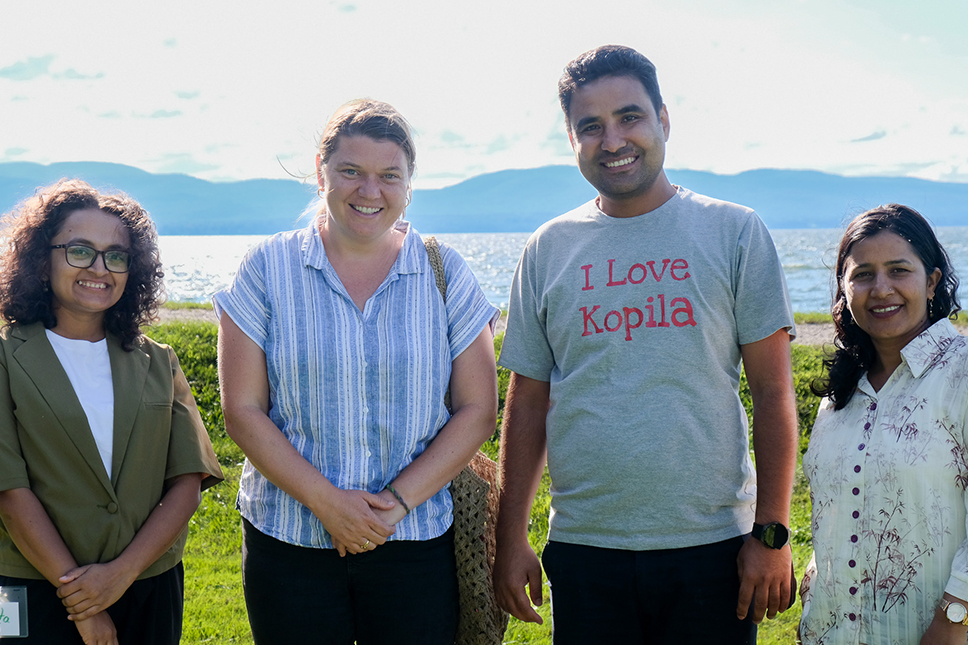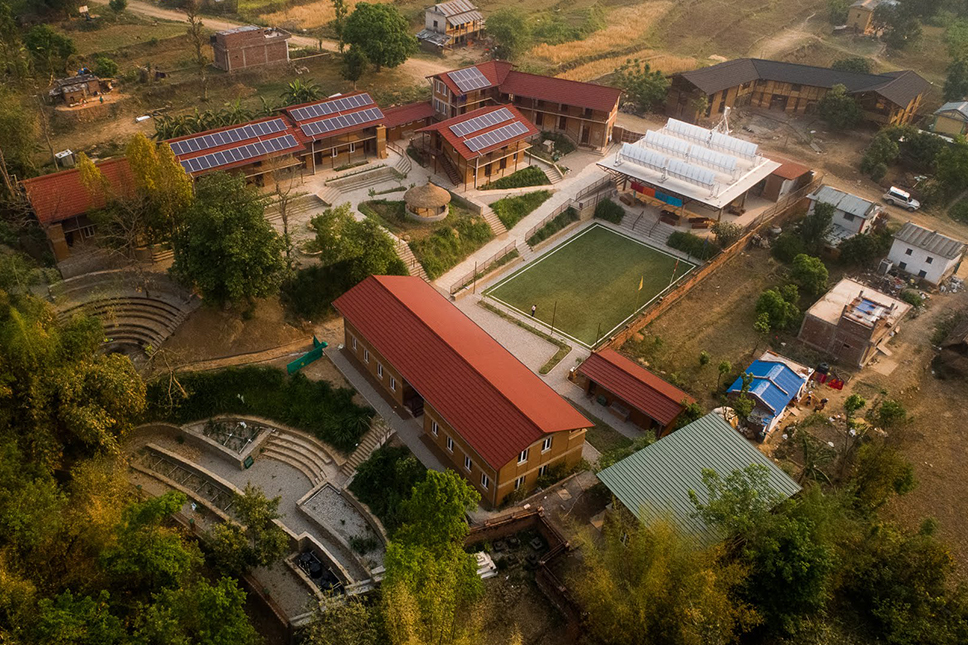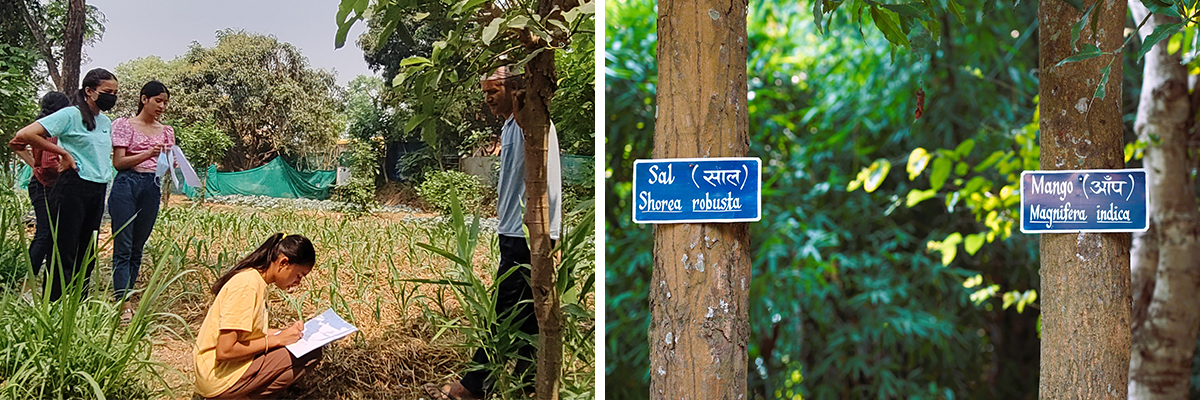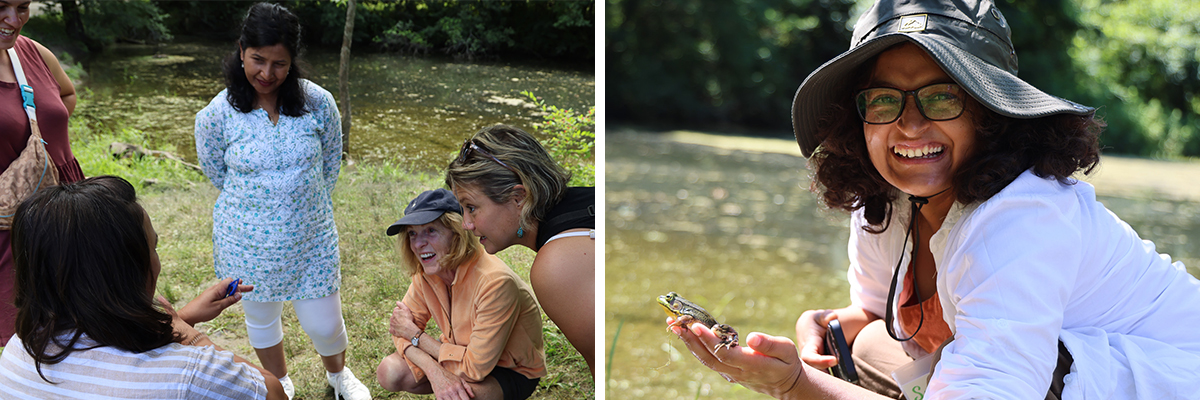A Conversation with Nepal's Kopila Valley School

From more than 7,000 miles away, we were thrilled to welcome a team of educators from Nepal's Kopila Valley School to Shelburne Farms for professional learning this summer. (Despite the distance, Kopila is a longtime partner of Shelburne Farms and participant in Cultivating Pathways to Sustainability.)
At the end of their time in Vermont, we asked these four changemakers—Sunita, Maggie, Rajen, and Samjhana—to tell us about their school and share their reflections on sustainability.
Q: Tell me a little bit about Kopila Valley School and what you do.
Rajen: We provide free education to more than 400 students, from nursery school through Grade 12. We give priority admission to children who have been orphaned, abandoned, or who might otherwise not have access to an education. We also admit children from marginalized and socially disadvantaged ethnic groups.
As principal, I collaborate with and mobilize the school team to have the greatest impact on students’ knowledge. We also prioritize sustainability, health and wellness, and planning for students’ futures. Together, we support students to be engaged and productive so that they can learn. Also we want to instill in students love, care, and respect for nature to develop stewardship of the environment.

Q: What’s the story behind how Kopila Valley School came to be?
Maggie: Nineteen years ago I co-founded BlinkNow, which is the U.S. 501(c)(3) entity or the engine that fuels the work of Kopila Valley School. Kopila Valley is Nepali-run and governed by its own board.
Our goal was to go into an incredibly impoverished, struggling region and try to end cycles of poverty and marginalization, amongst children especially. The greatest opportunity to end poverty is through education. But the education that we saw there was just not up to standard, from basic infrastructure to instructional practices. We set out to build a full-service community school that could not only serve children but model what education could look like around the world. A lot of times, the Global South and regions struggling with poverty get less services, the bare minimum. But we wanted to create a school that we’d want our own children to go to, that’s loving, nurturing, safe, and nature-based.
We brought together some of the best architects, environmental engineers, farmers, and leaders who shared that vision. Slowly, step by step, we started building a school that was integrated with the community. Now sustainability is everywhere at Kopila—we have rainwater harvest, solar power, edible landscaping, a garden, and animals. Our school is very outdoors—you can’t go from one classroom to another without going outside. We built one of the world’s first rammed-earth schools, which is more resistant to earthquakes.
As part of our mission to address the needs of the whole child and family, we also operate the Kopila Valley Children’s Home, a loving family for children who have been left without parents. About 50 children live in the home now, and more than 30 have graduated into young adulthood and independent living. Knowing that it’s best to keep families together whenever possible, we also started the Kopila Valley Women’s Center to provide job training, empowerment courses, and social network support for local mothers and caregivers who are supporting their families.
We’re trying to raise the ceiling of what education can look like, while also raising the floor for the children who are struggling the most. It’s very challenging work. Ultimately, we’re trying to stop poverty in its tracks.
Q: What’s your role in advancing sustainability at Kopila Valley?
Sunita: Sustainability is one of our foundational beliefs. Part of my work as sustainability coordinator is to engage with teachers and their students to support them in integrating sustainability through everything we do, inside and outside of the classroom. Sustainable practices show up in our physical infrastructure and facilities and how we connect with our community. For example, we have a strong focus on creating sustainable food systems; to do this, we work on regenerative farming practices with local smallholder farms. We call ourselves the greenest school in Nepal!

Q: What about in the early childhood classrooms, how does sustainability show up there?
Samjhana: Place is the most important thing. From place and by connecting with nature, kids learn lifelong skills. As an early childhood educator, I love taking my kids outside, observing and working with nature and the community. We try to make our kids...nature kids.
For many of our children, they have a lot to overcome. Sometimes, we need to start inside, just hold them, connect with them, and help them get ready to start to learn. We have the opportunity to make them better humans. At Kopila, they can feel surrounded by people, nature, all of the natural creatures from their place.
Q: Can you say a bit more about the context you work in?
Maggie: We work in the Karnali Region of Nepal, and it’s struggling in particular. There was a civil war in Nepal just before I arrived. It’s a food-deficient country and one of the poorest in the world. There are more than one million orphaned children in Nepal. And our region is incredibly remote because of the Himalayan Mountains, and very underdeveloped. Not only that, we get hit with natural disasters. My BlinkNow co-founder is from the region and an orphan himself, so we knew when we started that “development” is not just one thing, it’s not a quick fix. It’s an integrative, complicated web. So we said, let’s start with the child. What does a child need to thrive and grow? And, the community needs healthy, thriving children, but you need one to take care of the other. So, we take a very community-based approach. Women and mothers are integral to our work—we want to stop children from becoming orphaned in the first place. Health and wellness, family development and social work, food, nutrition, it’s all part of it.
Q: I’m struck by all the ways sustainability is woven into the school. For the last two weeks at Shelburne Farms, you’ve heard many ways that schools in America want to be more like Kopila. How are you thinking about that as you go back to Nepal?
Maggie: Yeah! Like, our school lunch is grown by local Indigenous farmers, and the kids get to know the farmers. When those lunches come to school, there’s no disposable packaging on them. There’s no vehicles on campus—we all ride our bikes or walk. In Nepal, you know who your neighbors are. Some people think of our region as being really backwards, but in many ways, I think we have sustainability right. So yes, I’m thinking about how we can uplift that wisdom and also equip our students for the modern world that they’re emerging into. How do we celebrate Nepal and our ways of being?

Q: Really what you’re talking about in the case of Kopila and much of Nepal is, sustainability is a way of life. It’s core to survival, right?
Maggie: Exactly. It’s life-saving, and life-giving. Climate change is deeply felt for us. Like, if you don’t get your monsoon on time, you don’t have a rice harvest. If you have a bad crop, you don’t eat. There’s a lot more at stake for the Nepali community. When we talk about Himalayan springs and the lack of water, irregular seasons, heat waves...sustainability feels mission-critical, just like food, just like clean water. Sustainability isn’t a luxury, it’s our way of being and surviving. Coming away from this experience at Shelburne Farms, we need to remember that as Nepali people, we have so much of what the rest of the world wants: nature integrated into life, people living in community, solidarity.
Rajen: We cannot afford to be unsustainable in Nepal. In training here these last two weeks, we’ve talked about a lot of things our students already do, like gardening, composting, outdoor learning, and visiting farmland.
What I’ve learned here is program design and execution. I'm also impressed by the documentation processes. I look forward to sharing these takeaways in my school. Each and every moment spent at Shelburne Farms has been very fruitful and a good learning experience, especially with relation to sustainable practices and how we can replicate the ideas in our school.
Samjhana: I’m very grateful that I got the opportunity to participate in these programs. It’s very helpful for me to get new activities and ideas that I can bring to my children.
Sunita: This training has been an amazing opportunity to reflect on our work, to get to know the contexts and experiences of educators from around the U.S., and their perceptions of Nepal. I see Nepal as a model country, and Kopila Valley as a model school for all the schools around the world in terms of sustainability. I urge everyone to get to know a little more about our work—and if you have recommendations, tell us!
Q: What else might you want to share with educators here in the U.S.?
Sunita: All the work we are doing is also related to justice. Nepal is one of the most vulnerable countries in terms of climate change, and every livelihood is being impacted by it. Climate change is very, very visible, so sustainability is a must for us. We must do something about that. And we feel motivated to work on this for the justice of our people. I urge educators around the planet to see Education for Sustainability as a medium for creating a just, compassionate, and hopeful world.
Rajen: Ultimately, we all are traveling in one spaceship that is Mother Earth. Maybe some of us will get impacted earlier by climate change, but later on, it will come back to every one of us. And I’d like to say about the people of Nepal, despite all of the scarcity, despite not having basics like access to safe drinking water, sanitation, health care, or education, they try to live sustainably, and I feel they are happy despite these extremes. Our government must have more focus on these things, and we need to work together to eradicate the cycle of poverty.
Young kids, they will change this world. They are the future. How we teach them, we are developing the future. By making things more sustainable, we’re making this a planet where everyone can flourish.
Read more stories from Kopila Valley School in our publication, “Learning Locally, Transforming Globally.”
Follow BlinkNow on Instagram for updates on their work and news about the documentary "Between the Mountain and the Sky," featuring Maggie and the Kopila Valley children. Watch the moving trailer below.
